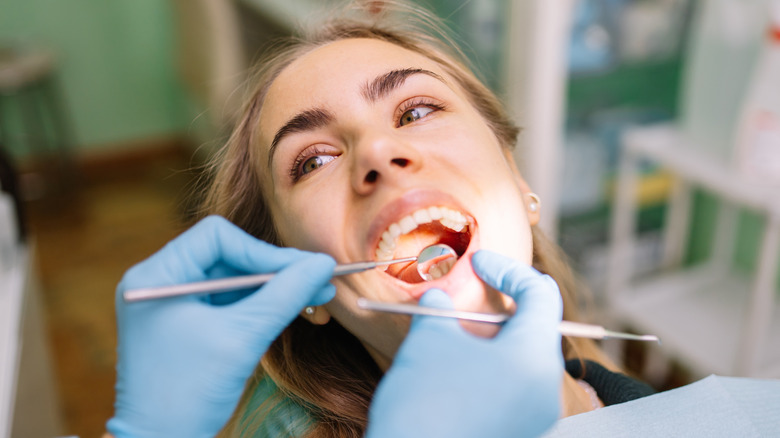If You Can't Find The Cause Of Your Tinnitus, You May Want To Look At Your Teeth
Do you ever hear ringing, buzzing, or pulsing sounds that no one else seems to notice? You're not imagining things. Chances are, you're experiencing tinnitus, a condition that affects up to 20% of people, according to the Mayo Clinic. Tinnitus has many possible causes, including ear infections, head injuries, or even the early stages of hearing loss. Certain medications can also trigger it or make it worse.
One lesser-known cause is a problem with the joint that connects your jawbone to your skull, called the temporomandibular joint (TMJ). If you grind your teeth — a condition known as bruxism — it puts extra pressure on the TMJ, which can also affect the nerves connected to your ear. That ringing you hear could be your body's way of responding to the stress and strain from bruxism. In fact, the more severe the grinding, the more intense your tinnitus may become (per the Oral and Facial Surgery Center).
And it's not just teeth grinding that can cause tinnitus. Your oral health and your hearing are more connected than you might think, and issues with one can sometimes show up in the other.
The link between teeth grinding and tinnitus
Grinding your teeth while you sleep may hint at sleep-related medical conditions, but grinding while you're awake is actually more common, according to Neurology Solutions. Whether it happens during the day or night, bruxism can wear down your teeth, damage enamel, and cause headaches. Since it puts extra stress on your temporomandibular joint (TMJ), it also raises your risk for a temporomandibular disorder (TMD). TMD can show up as jaw pain, popping sounds when you move your jaw, or even limited jaw movement.
A 2024 study in Acta Odontologica Scandinavica explored the connection between dental issues and tinnitus in more than 3,000 patients. The researchers found that people with bruxism had a 46% higher risk of "pathological tinnitus," which were episodes lasting longer than five minutes for more than a week. Toothaches were linked to an even greater risk of pathological tinnitus — 84% higher. While about one-third of tinnitus patients also had TMD, the study found TMD itself wasn't a direct risk factor. Still, a 2019 study in Frontiers in Neuroscience showed that TMD can make tinnitus worse. In those cases, the ringing tended to be louder, shift with head movements, and intensify with stress.
Tinnitus may involve the alignment of your teeth
When your wisdom teeth start to come in, you might notice ringing or buzzing in your ears. An impacted wisdom tooth can cause inflammation in the middle ear, and bacteria may lead to an infection that triggers tinnitus. Even the extraction process itself can temporarily cause tinnitus because of the loud noise from the dental drill.
Tinnitus may also be linked to how your teeth fit together, according to a 2019 article in Medical Hypotheses. Misaligned teeth can force your jaw muscles to move abnormally, creating extra tension. This, in turn, can affect the tensor tympani muscle in the ear and lead to tinnitus, ear pain, a blocked-ear sensation, or even temporary hearing loss.
If you suspect your tinnitus is connected to your teeth, a dentist may recommend treatments to address the root cause. Bite guards or nerve stimulation, for example, can help relax the jaw muscles and nerves. If you're scheduled for a tooth extraction, avoiding alcohol, caffeine, stress, and tobacco beforehand may reduce the chances of tinnitus. Noise-related tinnitus after an extraction usually goes away on its own.


